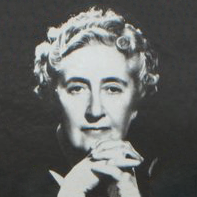Like most authors, I’ve had my share of rejection slips. I suppose I’m lucky in that most of mine were what is rather sweetly termed ‘rave rejections’. In other words, they generally took the line of ‘We love your writing, but in the current marketplace … risk of signing a debut novelist …overcrowded women’s fiction market …’ and so on.
I take a little consolation in knowing that ‘twas ever thus. The list of writers who were serially rejected is huge. Gone With the Wind was rejected 38 times. (It has sold 30 million copies.)

Agatha Christie, via Wikimedia Commons
Agatha Christie had to wait years before she was accepted for publication – now she is the biggest selling author of all time, excepting William Shakespeare. JK Rowling was rejected by 12 publishers (who must be bitterly regretting their decisions now). I can go on – Stephenie Meyer (Twilight, rejected by 14 agencies), Kathryn Stockett (Help, rejected 60 times), Jasper Fforde (The Eyre Affair, 76 times), James Patterson, a dozen publishers.
When I interview authors on my blog, one of the standard questions I ask is, what are your top tips for writers. Without exception, they say, persist, keep writing, believe in yourself.
It’s hard though. If I’m honest, I found the effect profoundly depressing. For a number of years – despite being signed successively by two agents who were strongly supportive of me – I couldn’t get my work out to readers. I began to doubt my skill. If it hadn’t been for the support of fellow writers (including three lovely bestselling authors who always believed in me) in me, I might have given up. Then I was signed by the lovely Accent Press, I was lucky enough to be given an editor who loves my writing, and as a result, my creativity and confidence have blossomed.
We might think that it’s all the fault of editors – and surely we must query some judgements? I’m not sure that history records how Rudyard Kipling reacted to being told he didn’t know how to use English language, or John le Carré to the announcement that ‘he didn’t have any future’. Louise May Alcott was told to ‘stick to teaching’. But editors are readers, like the rest of us. They have their own loves and hates, they may be rooted in what has worked in the past, or under instruction to play safe. Thankfully, there are other ways to reach the reading public now, and many an author who has started out by self publishing has been subsequently been snapped up by a trad publisher later (or continued to success as an indie).

But can you learn from rejection? Some authors certainly believe so. Sylvia Plath said, ‘I love my rejection slips. They show me I try.’ CS Lewis became more and more determined to succeed through the years of rejection. David Mitchell received a rejection from an editor at Harper Collins that ‘shredded my first-born novel, laughed at my phrasing, twirled my lacy pretensions around and gobbed into the seething mosh pit of my stolen clichés’. He tore up the slip – but took the criticism to heart and used it to progress. And Beatrix Potter showed her self belief by eventually publishing The Tale of Peter Rabbit herself. [This illustration Beatrix Potter (Public Domain) via Wikimedia Commons].
Rejection can sapping and demoralising, but do try to turn the negative energy into positive energy, find support where you can, and keep writing. You may be the next multi-million bestseller.
COMPETITION!
 The latest result of my persistence is making it to the bookshelves this month. Between Friends is set in Edinburgh and revolves round three women whose lives, careers, marriages and friendship are threatened by the return into their lives of a man from their past. Only by pulling together can they survive – but is the man too clever at sowing distrust?
The latest result of my persistence is making it to the bookshelves this month. Between Friends is set in Edinburgh and revolves round three women whose lives, careers, marriages and friendship are threatened by the return into their lives of a man from their past. Only by pulling together can they survive – but is the man too clever at sowing distrust?
I’m offering a free signed paperback to one Take Five Authors reader who signs up for my newsletter at http://jennyharperauthor.co.uk then tweets using the hashtags #BetweenFriendsComp and #TakeFiveAuthors. (Don’t worry – there’s always an option to unsubscribe later – though I hope you won’t!).
I’ll choose a winner on 25th February. Good luck!

The one thing I realized early on was that taking any role in life demands experience and competence in all aspects involved. I am not depressed by rejection, nor does it make me more determined. I stopped caring long ago, for admitted or not, the customers make the decision who succeeds, all the marketing and analysis is actually only a third-party attempt to find an explanation for it.
Two nights ago I read that the toll or penalty for bursting my bank loan has become higher than any income I can achieve. Straight after that a rejection of one of my short-stories being not wanted. The first is bad because I never wanted to become a problem to a chosen business partner. The rejection of my short-stories is a mere routine instead.
If sanity would have anything to do with capitalism, then unleashed publishing which only can destroy the markets would be outlawed. But until that day there will be a great number of authors who never really become famous, nor capable of living from it, and who actually just exist for those milking them for money find it convenient to allow them their delusions.
LikeLike
Interesting response – thank you. I believe you are right – to a certain extent. However, there are some who do slip through the net of editorial decision making. Possibly those authors who truly do believe in themselves and who do persist are writers who just need to find the right place to settle, and those who don’t keep going deserve to fade away anyway. But there must be some treasures who have faded away without ever seeing the light of day.
Sorry about your other news, but thanks for taking the time to drop by here.
LikeLiked by 1 person
Thanks, and good luck to you!
LikeLike
So glad you kept going, Jenny. You’re an inspiration! Looking forward to reading Between Friends. 🙂
LikeLiked by 1 person
Thank you Rae. YOU keep going too! Jx
LikeLiked by 1 person
Reblogged this on EvaJordanWriter.com and commented:
If you are a writer you will experience rejection – that’s a given. The trick is to learn from it, embrace it and carry on regardless. Take a look at this inspiring piece about rejection – and then get back to writing!
LikeLiked by 1 person
Thanks for dropping by Eva, and for reblogging. It’s hard not to feel down in the face of rejection, but you always have to hope that the next letter will be an acceptance.
LikeLiked by 1 person
There’s hope for us all then! 😊
LikeLiked by 1 person
Sure – never lose hope!
LikeLiked by 1 person
Surprisingly, and perhaps very fortunately, I’ve never had any of my non-fiction ideas rejected, though I’ve had a few for my short stories (I haven’t written much) and quite a number for poems. So why am I still trying to write poetry?
LikeLiked by 2 people
A) Because you love doing it and B) because you are stubborn, feisty, determined …? Good luck with it, and thanks for dropping in on Take Five Authors.
LikeLiked by 2 people
I have all my rejections filed away, too, from the flat ‘thanks but no thanks’ to the rave rejections which liked the characters, the sense of place, the dialogue but…
An agent who read my non-fiction ms, which is now Drunk Chickens and Burnt Macaroni, said it was too ‘quiet’ and could I not introduce more scenes of Taliban soldiers whipping women. I did reply pointing out I wasn’t in Afghanistan when Taliban came to power and had not actually witnessed such scenes. She didn’t seem to think it mattered and the exchange left me wondering about the truthfulness in memoir.
Great post.
LikeLiked by 1 person
Oh dear! I had some ridiculous comments when I sent my first (historical) effort for a critique. I’m glad I went a different route.
LikeLike
Reblogged this on jennyharperauthor and commented:
Don’t be downcast! Rejections can be a great spur to success.
LikeLiked by 1 person
Reblogged this on Chicklit Sisters and commented:
Great post from Jenny Harper. And a competition to boot! Thanks Jenny. Between Friends looks like a fabulous read.
LikeLiked by 1 person
Great post Jenny. We’ve had our fair share of rejection slips and we’ve kept them all. Usually there’s something positive and negative in each one and not to be taken too much to heart. One person will love your story, another will hate it. Point is to persevere. As Sylvia Plath says it shows you’ve tried.
Love the sound of Between Friends 🙂
LikeLiked by 1 person
Thanks! You do need to muster strength and willpower to hang on in, but yes, rejections can have a very positive effect.
LikeLiked by 1 person
Thank Janet. I haven’t been organised enough to keep mine, though email acts as a record. I’ve kept a couple of the really lovely rejections though!
LikeLiked by 1 person
I’ve kept all my rejection letters and all my acceptances. Both are important. They are part of my journey.
I’m glad you stuck with it – and your books are now out there for folks like me to read 🙂
LikeLiked by 2 people